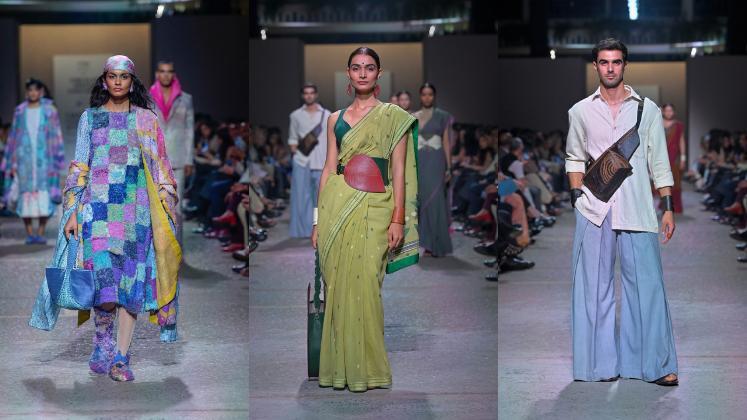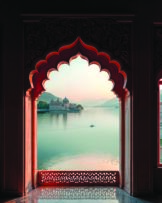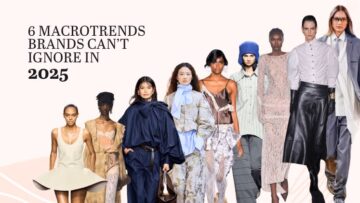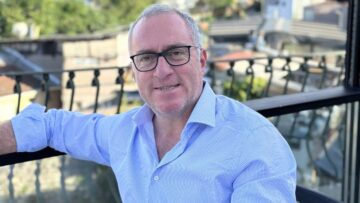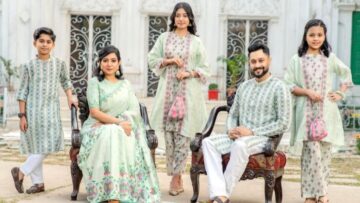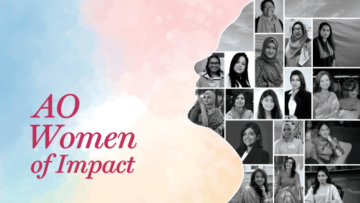The Circular Design Challenge (CDC), now a fixture during fashion week each season, was pioneered by RIL five years ago with a visionary mission to instill a sense of consciousness for sustainability and circular practices throughout every facet of the fashion industry. In a dynamic collaboration between RIL, the UN in India and Lakmé Fashion Week, this initiative sought to champion transformative ideals within the realm of fashion.
Over the years, the Circular Design Challenge has played a pivotal role in propelling India’s fashion industry towards eco-consciousness.
With the aim of giving a global platform to fashion design talent across the world, CDC announced, this season, its worldwide expansion that culminated in the latest season of Lakmé Fashion Week x FDCI. Presented by R|Elan, the next-gen fabric brand by Reliance Industries Limited (RIL), in association with the United Nations in India, the CDC focuses on cultivating eco-conscious creativity within the fashion industry for a greener and more sustainable future on a global scale.
For half a decade, CDC has identified and supported remarkable winners who combine fashion with environmentally friendly innovations. Some past winners include I Was A Sari, which upcycles discarded sarees while empowering women artisans; Malai Biomaterials Design, which creates sustainable alternatives to leather; Bandit, which masters the art of upcycling various materials into eco-cool products; and Pieux, which focuses on recycled materials and modular garment construction.
Having successfully become a catalyst for change, this season saw the CDC extending its competition on a global scale across the UK, EU and APAC regions and inviting designers from around the world to contribute to a more sustainable and circular fashion future.
| The Circular Design Challenge resonates with the global Lifestyles for Environment (LiFE) movement, recently endorsed by the G20. The CDC and LiFE are important threads in the UN partnership tapestry and we are thrilled that the CDC is bringing its message to the global catwalk for the first time. This reflects the centrality of India as a leader in both sustainable culture and climate action. Where India and its fashion industry goes, the world will increasingly follow.” – Shombi Sharp, UN Resident Coordinator, India |
The design challenge places emphasis on key sustainability parameters, evaluating aspects like biodegradability, durability and multi-functionality of products. Expert jury members then meticulously monitor factors such as energy efficiency, closed-loop systems and the ethical use of materials in production and aim to ensure that social and environmental impacts align with one or more United Nations standards of Sustainable Development Goals.
CDC’s global partners span borders, with collaborations including the British Council for the UK, Redress for Hong Kong/Asia-Pacific and Istituto Marangoni for the European Union.
This season saw Pei-Wen Jin from Asia-Pacific being announced as a finalist from the APAC region, while the India edition recognised ‘Studio Medium’ by Riddhi Jain and Dhruv Satija, ‘Banofi’ + ‘Studio Beej’ (Consortium) by Jinali Mody and Arundhati Kumar and ‘Without’ by Anish Malpani as the three finalists.
During the UK Jury meet, Amesh Wijesekera, a Sri Lankan designer based in London, secured a spot in the finals and Felipe Fiallo emerged as the finalist from the EU jury meet.
THE DESIGNERS/BRANDS
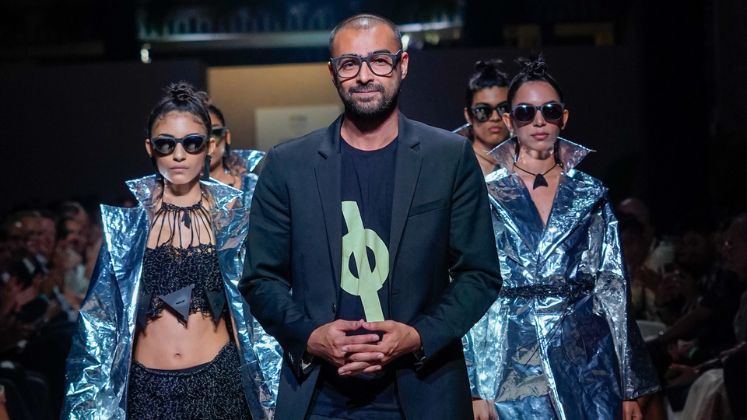
- Anish Malpani, Without – INDIA
Equipped with groundbreaking patent-pending technology, Without utilises discarded Multi-Layered Plastic (MLP) packaging to manufacture high quality materials, offering a versatile array of eco-friendly products.
Amongst its innovations, Without produces sunglasses crafted from repurposed chip packets, emphasising on practicality with features such as UV polarisation, durability and comfort. As an impact-focused start-up, Without champions a guilt-free consumption ethos by promoting circular products.
The brand also plays a pivotal role in enhancing the livelihoods of waste pickers, highlighting their commitment to social empowerment within their innovative process.
PRODUCT CATEGORIES, PRICING AND TARGET MARKET
“Our main product is world’s first recycled sunglasses made from plastic waste, which is currently priced at Rs.1500 and can be customised as per consumer preferences,” Anish Malpani, Founder of Without, told Apparel Resources.
The brand’s target market comprises Gen Z and millennials between the age group of 25 and 35 years based in Tier-1 cities of India.
“Our main idea is to reach out to socially conscious folks, who care about sustainability and fashion.”
PRODUCTION AND MANUFACTURING
The brand conducts its production and manufacturing entirely in-house. Plastic waste is sourced locally from waste pickers and the extraction process is carried out within the brand’s facilities.
Palettes are also locally sourced. For the glasses, lenses are typically procured from suppliers in China or India, while hinges are sourced from local distributors, emphasising a combination of local and international collaborations within the production process.
Commenting on the lead times, Anish said, “If we had to design a new pair, then the process would take somewhere around three to six months internationally. This would involve the process of sketching to the process of manufacturing. However, for our current style in the market, our lead time is a week.”
SOURCING
Since the primary raw material for the brand’s products is plastic waste, the waste products are locally sourced from Indian markets to meet the growing demand.
- Jinali Mody and Arundhati Kumar, Banofi + Studio Beej – INDIA
Banofi, an innovative plant-based leather derived from banana crop waste, seamlessly aligns with the core values of India-based Studio Beej, a brand specialising in plant-based accessories.
Their collaborative collection, Biparita, represents a fusion of cutting-edge bio research, traditional Indian craftsmanship and a strong commitment to climate awareness. Deeply rooted in Bengal, their home state, the collection not only engages with local craft communities for product development but also adheres to a vegan, cruelty-free and circular ethos.
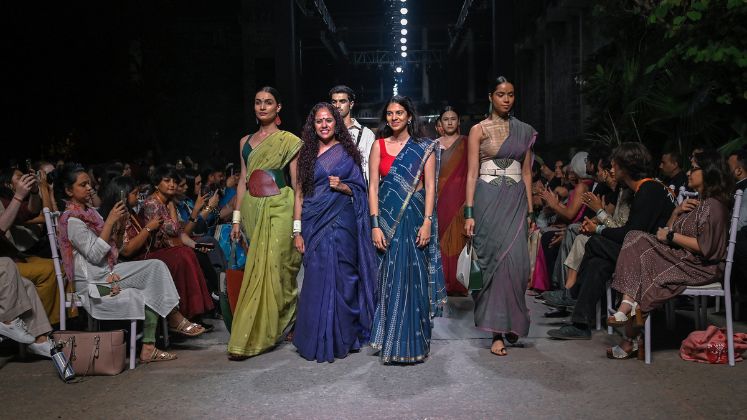
PRODUCT CATEGORIES, PRICING AND TARGET MARKET
At Beej, there are currently two main categories: Fashion and Lifestyle. In the Fashion category, up on offer are bags, wallets, belts and small accessories. In the Lifestyle category, the brand provides products for home, travel and gifting.
Beej’s primary market is in India, catering to both men and women aged between 30 and 50 years of age. The brand sells its products online through its website, channel partners and select offline stores, with a nationwide reach across India. Additionally, it offers global shipping services.
At Banofi, the team operates as a material science start-up specialising in the creation of a plant-based leather alternative derived from banana crop waste. The core product offering consists of Banofi leather panels, available in different thicknesses, colours and finishes, with price ranging between US $ 30 and US $ 45.
The brand caters to individuals aged 20 to 45, appealing to a diverse audience, particularly those who prioritise environmentally conscious choices.
Banofi’s products have garnered a global appeal, resonating with the international interest in conscious fashion. Presently, the majority of its clientele hails from the UK, USA and India.
PRODUCTION AND MANUFACTURING
Beej operates its own design, production and manufacturing unit based in Mumbai, handling the entire process in-house. On the other hand, Banofi also manages complete production in-house but opts for collaboration with other design studios to give life to its materials.
“In terms of lead time, at Beej, we produce in small batches and ship directly from our studio in Mumbai. A design can take anywhere between three to five weeks to launch online from the time we start working on the idea. On the other hand at Banofi, lead time from raw material to a finished Banofi panel takes four weeks,” Jinali Mody and Arundhati Kumar said.
SOURCING
“At Beej, all our materials are outsourced and we work with a mix of plant-based leathers as well as fabrics,” Jinali and Arundhati explained adding, “The plant-based materials we work with are patented and come from specific parts of the world: Cork- Portugal, Pinatex-Spain and Mirum-United States.”
Additionally, the brand also works with a recycled handloom material called khesh that comes from the Birbhum district of West Bengal and a small weaver community outside Bengaluru that uses post-consumer recycled yarn to make products.
Banofi, on the other hand, relies on banana crop waste as its primary raw material. The banana plant, being a perennial crop, generates abundant crop waste both in India and globally. The brand sources its raw material from over 30 smallholder farmers in India.
STRATEGIES TO CAPTURE ONLINE DEMAND
“At Beej, a large part of what we do is building consumer awareness and that we do through our social media channels, videos, interviews etc. We also do performance marketing, typically using Google and the Meta platform to reach out to new buyers,” the duo said.
Considering the limited availability of alternatives in its marketing channels, Banofi primarily relies on LinkedIn, Instagram Direct Messages and email marketing for boosting its online demand.
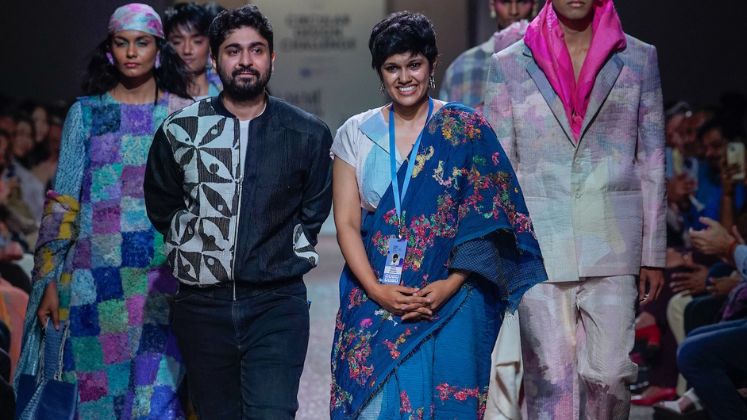
- Riddhi Jain, Studio Medium – INDIA
At Studio Medium, the essence of Bandhani is ingrained within its brand identity. Acknowledging the substantial waste generated by this technique in the form of thread waste and textile offcuts, Studio Medium has devised a template solution that allows it to transform significant quantities of silk offcuts and discarded cotton yarns into textiles and garments for future use.
The result is a collection of enchanting apparel and home textile pieces that serve as a testament to the idea of how inventive design is the key to the future of zero waste.
PRODUCT CATEGORIES, PRICING AND TARGET MARKET
The brand operates within two distinct categories, offering both womenswear and menswear. Its apparel range is priced between Rs. 24,500 and Rs. 75,000 with the target market comprising High Net Worth Individuals (HNIs) from both India and abroad.
The brand primarily caters to individuals aged between 30 to 70, with a focus on customers located in India, the United States, United Kingdom and the European Union.
PRODUCTION AND MANUFACTURING
Studio Medium manages its production and manufacturing in-house. However, given its specialisation in working with textile and yarn discards resulting from the tie and dye process, the brand collaborates with artisans across Gujarat and Rajasthan.
These artisans play a crucial role in collecting the discards and forwarding them to the brand.
Looking ahead, the brand’s long-term strategy involves establishing production and manufacturing units directly at the source of this pre-consumer waste, thereby streamlining and enhancing the sustainability of the production process.
Commenting on the lead times for the products, Riddhi said, “The design process to sampling takes about four months. Once the samples are ready and locked, production takes about three to four weeks.”
SOURCING
“We primarily work in handwoven silk from Bengal. For this collection, we have extended our vocabulary to handwoven denim, kota doria as well as factory surplus cotton. The handwoven silks are commissioned by us to the weavers and they are woven as per our designs,” Riddhi explained.
Studio Medium procures additional textiles from major vendors located in Kolkata, Bengaluru and Chandni Chowk. In certain instances, especially for specific surface techniques, the brand maintains a close collaboration with artisans situated in Kutch, Gujarat. This approach ensures a diverse and well-sourced selection of textiles while fostering partnerships with artisans for specialised techniques.
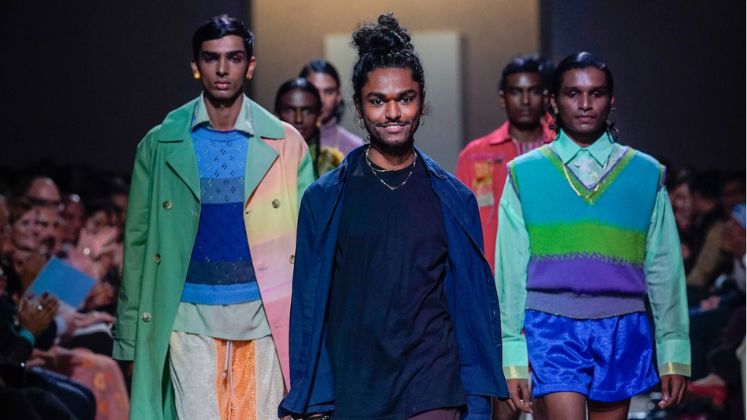
- Amesh Wijesekera – UNITED KINGDOM
Based in London, Amesh Wijesekera is a Sri Lankan designer who collaborates with skilled craftspeople across the island, particularly engaging with artisan communities specialising in knitwear, crochet and handloom.
As a semi-finalist for the LVMH prize, Amesh takes a diligent approach by working with surplus fibres from factories in an effort to close the loop on clothing waste within Sri Lanka and offering support to an industry that has historically been associated with unethical practices and mistreatment of craftspeople.
PRODUCT CATEGORIES, PRICING AND TARGET MARKET
Amesh Wijesekera essentially works with artisanal and non-artisanal materials which include ready-to-wear and bespoke exclusive items. Ready-to-wear products include pieces like shirts, trousers, shorts, that range from € 100 and upwards whilst artisanal products range from upwards of € 300. Its exclusive pieces like jackets and coats are towards a higher range of around € 300-400 plus.
“Our target market is predominantly in Europe, America and in the South Asian region. In terms of age, we cater to the age group of 28 to 45 because we cater to a seasonless, gender-fluid wardrobe,” Amesh Wijesekera highlighted.
PRODUCTION AND MANUFACTURING
Everything within the brand is meticulously designed, crafted and sourced in Sri Lanka. The artisanal textiles, a showcase of skilled craftsmanship, are exclusively made in Sri Lanka by diverse communities spanning the entire island.
The brand primarily collaborates with weaving communities and artisans specialising in knitting and crochet. Notably, the manufacturing process for clothing is entrusted to women-led Small and Medium Enterprises (SMEs), contributing to a diverse and empowered workforce.
“Because we work very hands-on, everything is made in Sri Lanka locally and we are still a small brand. However, when we do have interest from buyers, it usually takes a minimum of three months for the entire process – production, development and shipping,” Amesh explained.
SOURCING
The brand predominantly utilises materials such as cotton, cotton blends and wool. Notably, a significant portion of the wool used is sourced from deadstock materials in Sri Lanka. Given the country’s substantial apparel manufacturing industry, there is often an abundance of leftover textiles, trims and materials that typically find their way into landfills or second-hand street markets.
The brand strategically acquires these discarded textiles from such sources and, in a sustainable approach, imparts them with a renewed value. Through various processes like printing, embellishments and washing treatments, the brand enhances and transforms these materials, giving them a second life and contributing to a more sustainable fashion cycle.
Commenting on the same, Amesh said, “Because I come from a textile design background, we make our own materials, everything is made bespoke for the brand. In terms of raw materials and textiles, all the primary textiles, the artisanal textiles are handwoven, hand-knitted or crocheted in Sri Lanka and all our secondary textiles come from pre-consumer waste from the garment district.”
STRATEGIES TO CAPTURE ONLINE DEMAND
Something that has worked well for Amesh and his namesake label is their storytelling ability, especially in terms of how they do their photoshoots, editorials and campaigns.
“I think consumers are more receptive to this communication as opposed to product first information and it really encourages them to be a part of this whole community movement and it has been doing really well for us,” Amesh said.
- Felipe Fiallo – EUROPEAN UNION
Felipe, an Ecuadorian national residing in Italy, is revolutionising the luxury footwear sector by seamlessly integrating digital fabrication, sustainability and style.
Guided by the principles of biomimicry, his design approach harmoniously blends technology and craftsmanship to produce exceptionally innovative footwear.
With a focus on regenerative design, Felipe is deeply respectful of the environment and actively advocates for cradle-to-cradle practices. Through his work, he envisions a more sustainable fashion industry that embraces and promotes ecological principles.
PRODUCT CATEGORIES, PRICING AND TARGET MARKET
FELIPE_FIALLO® is a bio-digital couture footwear brand based in Milano with a Latin American spirit. The brand encompasses three primary lines: Bio-couture, Phygital Luxury and Ready-to-Wear, targeting a price range spanning from € 475 to € 1200.
Catering to individuals aged 22 to 38, FELIPE_FIALLO® caters to both men and women. The brand’s focal markets include Europe, Asia and India, with its headquarters situated in Milan, Italy.
PRODUCTION AND MANUFACTURING
Production and manufacturing for the brand are carried out in collaboration with a partner network across Europe, specifically in Italy, Germany, Portugal and the Netherlands. Additionally, the brand collaborates with indigenous communities in Ecuador for certain aspects of the production process.
Some biomaterials, such as crystal growing, are skillfully crafted in-house in Milano.
“From the footwear design process, prototyping, material innovation, sampling and sales campaign to the warehouse, we take six months,” Felipe told Apparel Resources, adding, “We launch two collections yearly with two capsules for experimental drops.”
SOURCING
“Our materials are a mix of both. For our bio-couture line, we are creating our own bio-materials like mushroom leather, grown crystals and algae between Italy and Netherlands,” Felipe explained.
The brand sources various materials from local producers and warehouses in Italy. Currently, the primary production areas, depending on the specific product lines, include Veneto, Tuscany and the South of Italy. There is an ongoing initiative to establish a network of local hubs for each target market, aiming to champion local production and foster innovation within those regions.
STRATEGIES TO CAPTURE ONLINE DEMAND
FELIPE_FIALLO maintains a robust offline presence, particularly during significant fashion events such as London and Milan Fashion Weeks. These events generate substantial traction, positively impacting the brand’s online visibility.
At the moment, FELIPE_FIALLO’s main digital channels are Instagram and LinkedIn where the brand shares news and product updates. It is also working on its own e-commerce platform to offer a more personalised service to its clients. For its phygital items, the brand is a part of The SYKY Collective, a first-of-its-kind digital fashion platform, for fashion lovers and WEB 3 explorers.
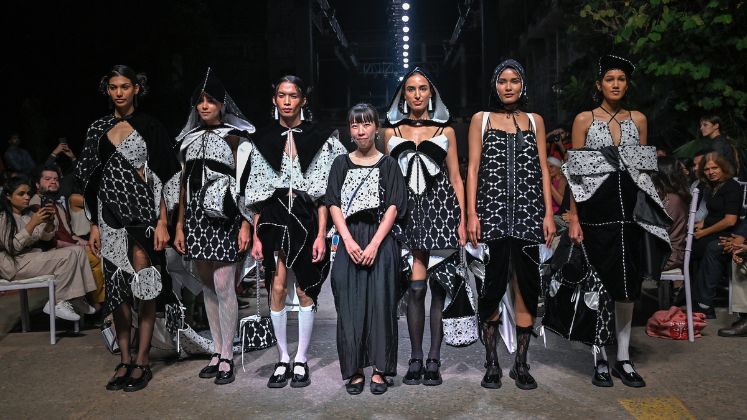
- Pei Wen Jin – ASIA-PACIFIC
Dedicated to mastering the craft of zero waste design for a circular future, Pei Wen is at the forefront of sustainable innovation. Holding patents for her modular zero-waste pattern invention and pioneering design techniques in Asia-Pacific, she stands out as a trailblazer.
Furthermore, her acclaimed collection, ‘Tangram Club,’ secured the runner-up position in the prestigious Redress Design Awards 2021, the world’s largest sustainable fashion design competition.
Recognising that over 80 per cent of a product’s environmental impact is determined during the design phase, Pei Wen firmly believes that for designers, prioritising sustainability in every decision is essential for fostering an industry that coexists harmoniously with nature.
PRODUCT CATEGORIES, PRICING AND TARGET MARKET
The Tangram by Pei Wen Jin is a modular fashion concept that represents a practical DIY approach for creating a circular wardrobe. Customers can disassemble their clothes into modules and reassemble them into various styles using a very simple action. The brand targets 20 to 45 year olds who love DIY and enjoy creating various styles.
“Our modular clothing can be purchased individually as single modules, or customers can buy a kit, allowing them to follow the instructions to assemble different clothing and accessories, much like playing with Lego to create their own style,” Pei Wen Jin told Apparel Resources in an exclusive interview.
Pei Wen Jin provides a diverse array of price points determined by the materials employed, with The Tangram kits retailing from US $ 85 onwards. Having recently secured a patent this year, its designs are currently in the market development phase, with aspirations to make them accessible to international consumers.
PRODUCTION AND MANUFACTURING
Currently, the brand’s in-house team produces all its products internally. However, it is on the lookout for collaborations with various fabric suppliers or fabric brands to launch limited edition collections.
In terms of lead times, the time from placing an order to shipping can range from two weeks to one month for regular consumers. However, Pei Wen Jin also aims to collaborate with various fabric material suppliers to develop a more diverse range of The Tangram modules. Such collaborative development, from design discussions to shipping, may take anywhere from three months to half-a-year.
SOURCING
So far, Pei Wen Jin has been sourcing waste materials locally, primarily purchasing surplus fabrics from garment factories. This approach not only supports environmental sustainability but also allows it to offer more affordable price ranges to consumers.
However, “our modular concept can also be applied to luxury fabrics to create exquisite styles. Through the CDC, we had the opportunity to explore intricate craftsmanship in India and we are very eager to collaborate with India’s local craftsmanship,” Pei explained.
STRATEGIES TO CAPTURE ONLINE DEMAND
Currently, the brand utilises social media, primarily Instagram, as a platform for online marketing where it shares short videos demonstrating how to easily create everyday styles. It also actively participates in international competitions and fashion weeks, showcasing The Tangram’s limitless potential, ranging from simple to intricate haute couture clothing designs.
THE WINNERS
Since 2018, CDC champions are selected through an annual competition, judged by captains of the industry and the United Nations India teams. The jury for the final contest comprised Atul Bagai, Country Head, United Nations Environment Programme’s (UNEP) India Office; Christine Goulay, Founder, Sustainabelle Advisory Services, Ex-Head of Sustainable Innovation, Kering Group; Aditi Mayer, Sustainability Activist and Photojournalist; and Rahul Mishra, Fashion Designer.
The winner, Anish Malpani, secured funding amounting to Rs.15 lakh, the prestigious CDC trophy and a six-month mentorship program. Additionally, Anish earned the opportunity for a stand-alone showcase at Lakmé Fashion Week in partnership with FDCI, scheduled for March 2024. Felipe Fiallo, the runner-up, was awarded funding worth Rs.5 lakh. Both the winner and runner-up will be under the mentorship of Orsola de Castro, Co-founder of Fashion Revolution and Creative Director of Estethica.
The Circular Design Challenge serves as a testament to the potential of collaboration among industry players, the fashion eco-system and multilateral organisations like the United Nations. This alliance has proven to be a catalyst for transformative change, steering the fashion industry towards circularity and sustainable practices. The initiative aligns seamlessly with the principles outlined in Mission LiFE (Lifestyle for Environment) as announced by the Prime Minister of India, Narendra Modi.
Talking about Mission LiFe, Chief Guest, Honourable Minister of State for External Affairs and Culture, Meenakshi Lekhi said while addressing the audience, “Each one has a responsibility and each one has to participate and each one needs to practice, and not just preach, be part of Mission Life. The intention is to increase positivity and work towards finding solutions, because that’s the very Indian way of finding solutions, taking the middle path between the two extremes.”

